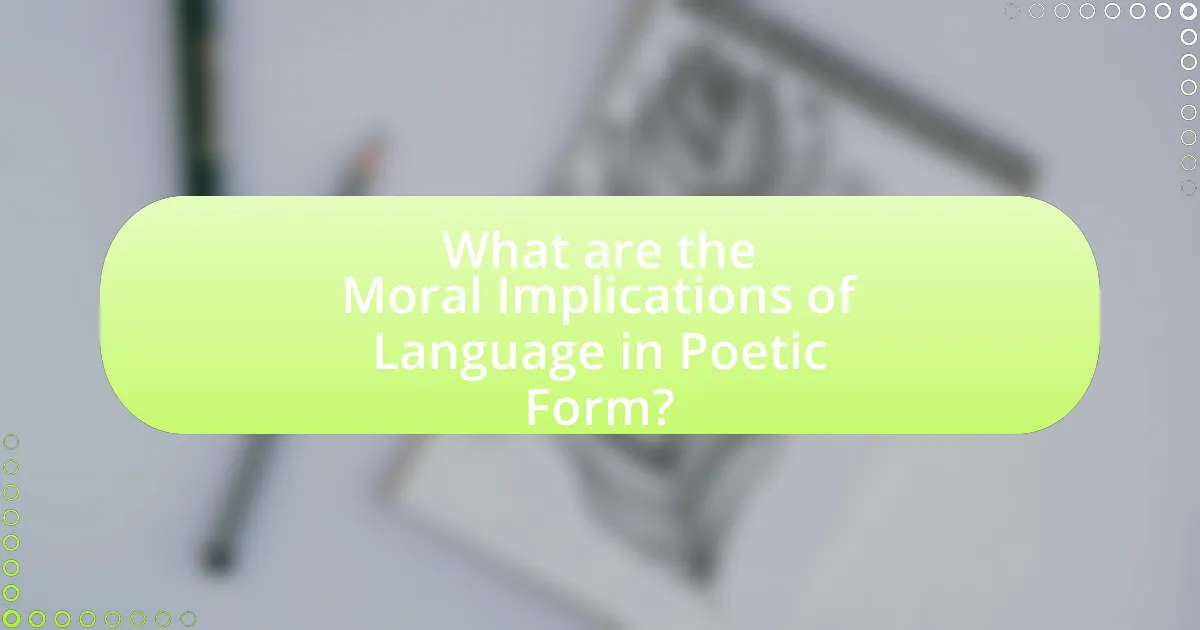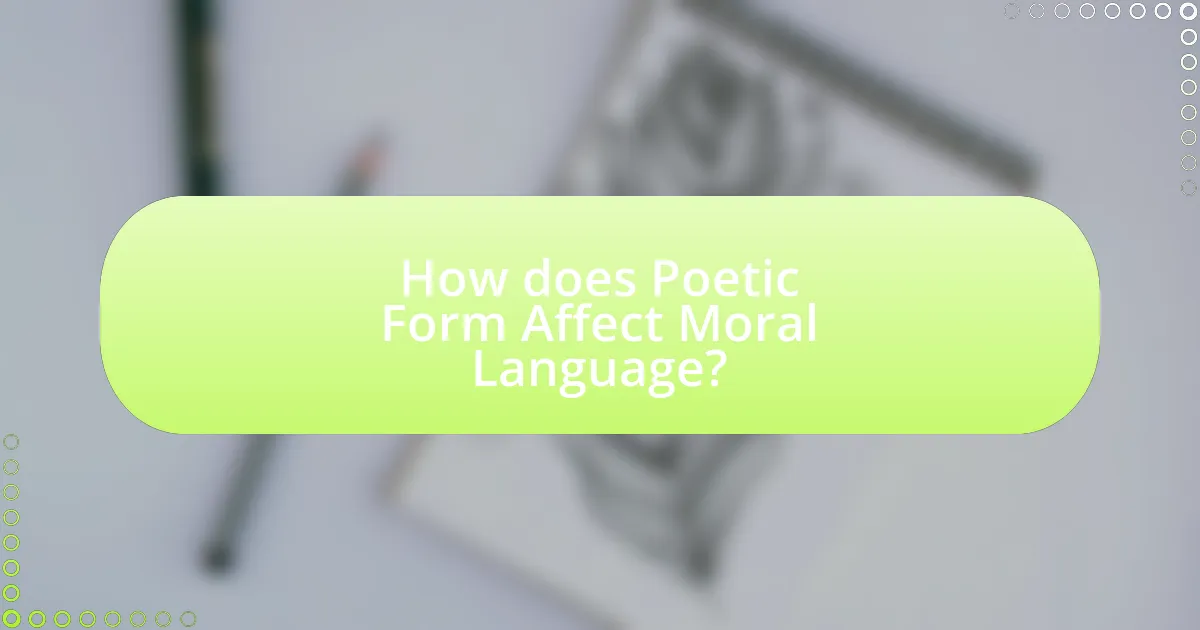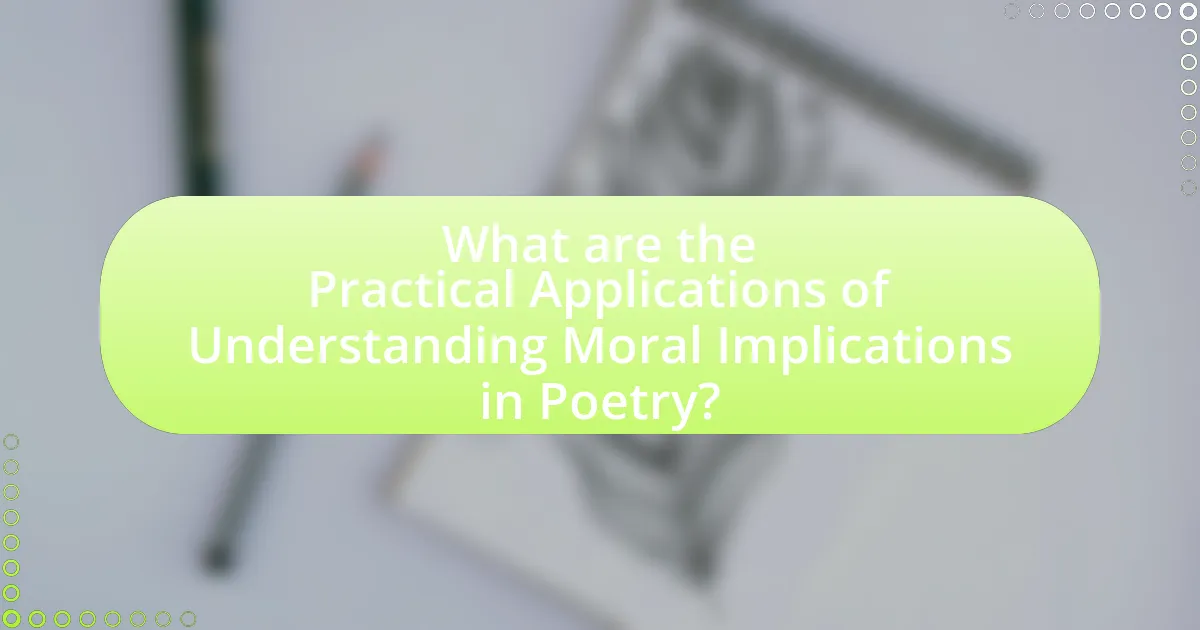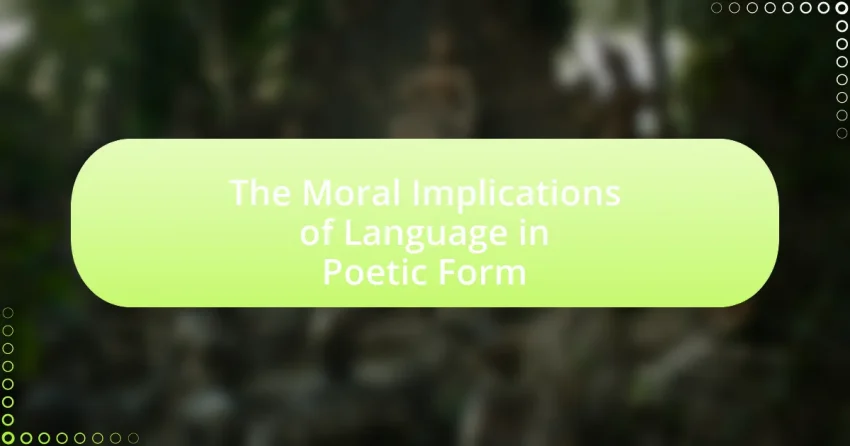The article examines the moral implications of language in poetic form, highlighting the responsibility of poets to convey ethical messages and influence societal values. It discusses how language shapes moral understanding through word choice, metaphors, and poetic structure, emphasizing the importance of these elements in conveying complex ethical themes. Additionally, the article explores the cultural and historical contexts that affect moral interpretations in poetry, as well as the practical applications of understanding these implications for critical thinking and empathy. It concludes with best practices for poets to effectively communicate moral messages while avoiding common pitfalls.

What are the Moral Implications of Language in Poetic Form?
The moral implications of language in poetic form involve the responsibility of poets to convey ethical messages and influence societal values. Poetic language can shape perceptions, evoke emotions, and challenge norms, thereby holding the power to inspire change or perpetuate stereotypes. For instance, poets like Langston Hughes used their work to address racial injustice, illustrating how language can serve as a tool for social critique and moral reflection. This demonstrates that the choices poets make in language not only reflect personal beliefs but also impact collective consciousness and ethical discourse.
How does language shape moral understanding in poetry?
Language shapes moral understanding in poetry by conveying complex emotions, ethical dilemmas, and cultural values through specific word choices and stylistic devices. Poets utilize metaphors, imagery, and symbolism to evoke moral reflections, allowing readers to engage with ethical questions on a deeper level. For instance, in Robert Frost’s “The Road Not Taken,” the language illustrates the moral implications of choices and their consequences, prompting readers to consider the weight of their decisions. This interplay between language and moral themes enables poetry to serve as a medium for exploring and questioning societal norms and personal beliefs.
What role does word choice play in conveying moral messages?
Word choice is crucial in conveying moral messages as it shapes the emotional and ethical resonance of the message. Specific words can evoke particular feelings, create vivid imagery, and influence the reader’s perception of right and wrong. For instance, using terms like “compassion” or “justice” can instill a sense of urgency and importance regarding moral issues, while negative connotations associated with words like “greed” or “betrayal” can highlight moral failings. Research indicates that language significantly affects moral reasoning; a study by Haidt and Graham (2007) in “Psychological Review” demonstrates that the framing of moral issues through specific language can alter individuals’ judgments and decisions. Thus, the deliberate selection of words is essential for effectively communicating moral values and influencing ethical behavior.
How do metaphors influence moral interpretations in poetry?
Metaphors significantly influence moral interpretations in poetry by providing nuanced comparisons that shape readers’ understanding of ethical dilemmas. Through metaphorical language, poets can evoke emotions and create vivid imagery that highlights moral complexities, allowing readers to engage with the text on a deeper level. For instance, in Robert Frost’s poem “The Road Not Taken,” the metaphor of diverging paths symbolizes choices in life, prompting readers to reflect on the moral implications of their decisions. This use of metaphor not only enriches the thematic depth of the poem but also encourages readers to consider the consequences of their choices, thereby enhancing their moral engagement with the text.
Why is the moral dimension of language important in poetic expression?
The moral dimension of language is important in poetic expression because it shapes the ethical considerations and emotional resonance of the work. Poets utilize language to convey moral themes, provoke thought, and inspire empathy, which can lead to social change. For instance, poets like Langston Hughes and Maya Angelou have used their work to address issues of racial injustice and human rights, demonstrating how moral language can amplify marginalized voices and foster awareness. This connection between language and morality in poetry not only enriches the artistic experience but also engages readers in critical reflection on societal values and personal beliefs.
What ethical responsibilities do poets have in their language use?
Poets have the ethical responsibility to use language thoughtfully and with consideration for its impact on society. This includes avoiding harmful stereotypes, promoting inclusivity, and being aware of the emotional weight of their words. For instance, poets can influence public perception and cultural narratives; therefore, they must strive to foster understanding and empathy rather than perpetuate division or misinformation. The ethical implications of language in poetry are significant, as poetry often serves as a reflection of societal values and can shape discourse on critical issues.
How can poetry challenge or reinforce societal morals?
Poetry can challenge or reinforce societal morals by presenting alternative perspectives and questioning established norms. Through the use of metaphor, imagery, and emotional resonance, poets can provoke critical thought and inspire social change, as seen in works like Allen Ginsberg’s “Howl,” which critiques societal conformity and materialism. Conversely, poetry can also reinforce societal morals by celebrating cultural values and traditions, as exemplified in Robert Frost’s “The Road Not Taken,” which emphasizes individual choice and personal responsibility. These examples illustrate how poetry serves as a powerful medium for both challenging and upholding the moral fabric of society.

How does Poetic Form Affect Moral Language?
Poetic form significantly influences moral language by shaping how ethical concepts are expressed and perceived. The structure of poetry, including meter, rhyme, and imagery, can evoke emotional responses that enhance the moral weight of the language used. For instance, the use of iambic pentameter in Shakespeare’s sonnets creates a rhythmic flow that emphasizes the gravity of moral dilemmas, making them more impactful. Additionally, the use of metaphor in poetry allows for complex moral ideas to be conveyed succinctly, as seen in the works of poets like John Donne, who often intertwined moral themes with vivid imagery. This interplay between form and language not only enriches the moral discourse but also engages readers on a deeper emotional level, reinforcing the ethical implications presented in the text.
What are the different poetic forms and their moral implications?
Different poetic forms include sonnets, haikus, free verse, and ballads, each carrying distinct moral implications. Sonnets often explore themes of love and beauty, prompting reflection on human relationships and societal values. Haikus, with their focus on nature, encourage mindfulness and appreciation for the environment, fostering a sense of interconnectedness. Free verse allows for personal expression and social commentary, often addressing issues like injustice and identity, thus challenging societal norms. Ballads, traditionally narrative, convey moral lessons through storytelling, often highlighting the consequences of human actions. These forms illustrate how poetry can shape ethical perspectives and influence cultural discourse.
How does structure influence the delivery of moral themes?
Structure significantly influences the delivery of moral themes by shaping how ideas are presented and perceived. For instance, the use of rhyme and meter can create a rhythmic flow that emphasizes key moral messages, making them more memorable. Additionally, the arrangement of stanzas can guide the reader’s emotional journey, highlighting contrasts between moral dilemmas and resolutions. Research indicates that structured forms, such as sonnets or villanelles, often encapsulate complex moral themes within their constraints, allowing for a focused exploration of ethical questions. This structured approach not only enhances clarity but also engages the reader on a deeper emotional level, reinforcing the moral implications conveyed through the language.
What are the effects of rhyme and rhythm on moral messaging?
Rhyme and rhythm significantly enhance moral messaging by making it more memorable and engaging. The use of rhyme creates a musical quality that aids retention, while rhythm establishes a pattern that can evoke emotional responses. Research indicates that people are more likely to remember and internalize moral lessons presented in a rhythmic and rhyming format, as demonstrated in studies on poetry and nursery rhymes, which show that children learn moral values more effectively through these structures. For instance, a study published in the journal “Cognitive Science” by researchers at the University of California found that rhythmic patterns in language improve recall and comprehension, thereby reinforcing the moral messages conveyed.
How do cultural contexts shape the moral implications of poetic language?
Cultural contexts significantly shape the moral implications of poetic language by influencing the values, beliefs, and social norms that inform the interpretation of poetry. For instance, in cultures where collectivism is emphasized, poetic expressions may prioritize communal values and moral lessons that reflect societal harmony, as seen in traditional African oral poetry, which often conveys communal ethics and responsibilities. Conversely, in individualistic cultures, such as those in Western societies, poetry may focus on personal experiences and self-expression, leading to moral implications that emphasize individual rights and personal truths. This variation illustrates how cultural backgrounds dictate the moral frameworks through which poetic language is understood, as evidenced by the differing interpretations of works like Walt Whitman’s “Leaves of Grass,” which celebrates individualism, versus the collective themes found in the poetry of Pablo Neruda, which often addresses social justice and collective identity.
What cultural factors influence moral interpretations in poetry?
Cultural factors such as historical context, societal norms, religious beliefs, and linguistic traditions significantly influence moral interpretations in poetry. Historical context shapes the themes and values expressed in poetry, as poets often reflect the moral dilemmas and societal issues of their time, such as the impact of wars or social movements. Societal norms dictate what is considered acceptable or taboo, affecting how moral messages are conveyed and received. Religious beliefs provide a framework for understanding morality, often guiding the ethical considerations within poetic works. Additionally, linguistic traditions can shape the way moral concepts are articulated, as different languages may have unique expressions for moral ideas. For instance, the use of metaphor and symbolism in various cultures can lead to diverse interpretations of moral lessons in poetry.
How does historical context affect the moral language in poetry?
Historical context significantly influences the moral language in poetry by shaping the themes, values, and ethical considerations that poets express. For instance, during the Romantic era, poets like William Wordsworth and Samuel Taylor Coleridge emphasized individual experience and nature, reflecting the societal shift towards valuing personal morality and emotional depth in response to the Industrial Revolution. This historical backdrop led to a moral language that prioritized human connection to nature and the importance of personal integrity. Additionally, the Civil Rights Movement in the 1960s inspired poets such as Maya Angelou and Langston Hughes to incorporate themes of justice and equality, using moral language to challenge societal norms and advocate for change. These examples illustrate how the historical context not only informs the content of poetry but also dictates the moral frameworks within which poets operate, making the moral language a reflection of the prevailing social and political climates.

What are the Practical Applications of Understanding Moral Implications in Poetry?
Understanding moral implications in poetry has practical applications in enhancing critical thinking and empathy. By analyzing the ethical dimensions of poetic works, readers can develop a deeper awareness of societal issues and human experiences. This understanding fosters the ability to engage in meaningful discussions about morality, ethics, and justice, as poetry often reflects complex moral dilemmas. For instance, studies show that engaging with literature, including poetry, can improve emotional intelligence and perspective-taking skills, which are essential for effective communication and conflict resolution. Thus, the practical applications of understanding moral implications in poetry extend to personal development, social awareness, and cultural critique.
How can readers critically engage with the moral aspects of poetry?
Readers can critically engage with the moral aspects of poetry by analyzing the themes, language, and context within the poem. This engagement involves examining how the poet’s choices reflect ethical dilemmas, societal values, and personal beliefs. For instance, a reader might explore how imagery and symbolism convey moral messages or provoke questions about justice, identity, and human experience. Analyzing historical context, such as the social issues prevalent during the poem’s creation, can further illuminate the moral implications embedded in the text. This method of critical engagement allows readers to understand the complexities of moral reasoning presented in poetry and encourages deeper reflection on their own values and beliefs.
What strategies can be used to analyze moral language in poetry?
To analyze moral language in poetry, one effective strategy is to examine the use of ethical themes and dilemmas presented in the text. This involves identifying key moral concepts such as justice, virtue, and responsibility within the poem. Additionally, analyzing the tone and diction can reveal the poet’s stance on moral issues, as specific word choices often convey underlying ethical judgments. For instance, the use of emotive language can highlight moral urgency or critique societal norms. Furthermore, contextual analysis, including the historical and cultural background of the poem, provides insight into the moral frameworks that influence the poet’s language. This approach is supported by literary criticism methodologies that emphasize the relationship between language and moral philosophy, as seen in works like “The Ethics of Poetry” by John S. O’Connor, which discusses how poetic language shapes moral understanding.
How can understanding moral implications enhance poetic appreciation?
Understanding moral implications enhances poetic appreciation by allowing readers to engage with the ethical dimensions of a poem, deepening their emotional and intellectual connection to the text. When readers recognize the moral themes, such as justice, empathy, or societal critique, they can interpret the poem’s message more profoundly, leading to a richer experience. For example, poems like “The Waste Land” by T.S. Eliot explore themes of despair and moral decay, prompting readers to reflect on their own values and societal issues. This engagement with moral implications not only fosters critical thinking but also encourages personal reflection, making the appreciation of poetry a more impactful and transformative experience.
What are the best practices for writing poetry with moral considerations?
The best practices for writing poetry with moral considerations include ensuring clarity of message, employing empathy, and utilizing ethical language. Clarity of message allows the poet to convey moral themes effectively, making it easier for readers to grasp the intended moral implications. Empathy enables the poet to connect with diverse perspectives, fostering a deeper understanding of moral complexities. Ethical language, which avoids harmful stereotypes and promotes inclusivity, enhances the moral integrity of the poem. These practices are supported by literary analysis that emphasizes the importance of responsible language use in poetry, as seen in works that address social justice and human rights issues.
How can poets effectively convey moral messages through language?
Poets can effectively convey moral messages through language by utilizing imagery, symbolism, and emotional resonance. Imagery allows poets to create vivid mental pictures that evoke strong feelings, making moral lessons more relatable and impactful. For instance, in Robert Frost’s “The Road Not Taken,” the imagery of diverging paths symbolizes choices and their consequences, illustrating the moral of decision-making. Symbolism further deepens the message; in William Blake’s “The Lamb,” the lamb represents innocence and purity, prompting reflections on creation and morality. Emotional resonance engages readers, as seen in Maya Angelou’s “Still I Rise,” where themes of resilience and dignity inspire moral reflection on social justice. These techniques collectively enhance the clarity and depth of moral messages in poetry.
What common pitfalls should poets avoid when addressing moral themes?
Poets should avoid oversimplification when addressing moral themes. Oversimplification can lead to a lack of depth in exploring complex moral issues, resulting in poetry that feels superficial or didactic. For instance, reducing intricate ethical dilemmas to binary choices can alienate readers who seek nuanced perspectives. Additionally, poets should steer clear of moralizing, which can come across as preachy and may disengage the audience. Instead, employing subtlety and inviting readers to draw their own conclusions fosters a more engaging and thought-provoking experience.
